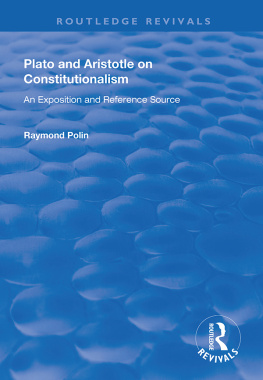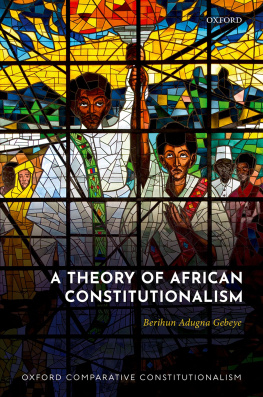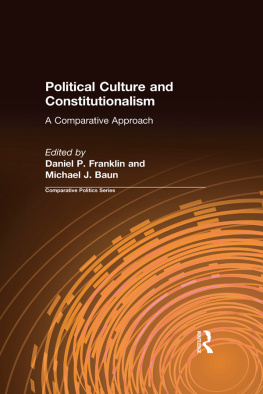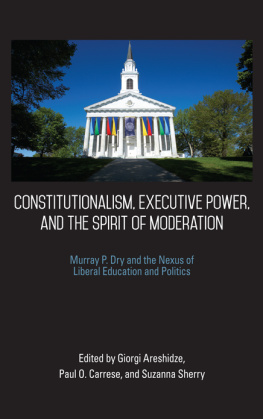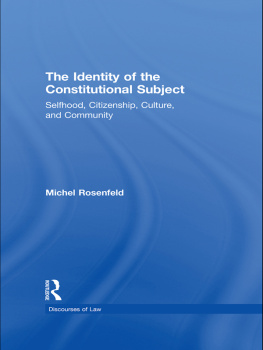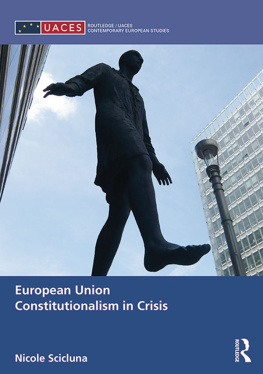First published 1988 by Ashgate Publishing
Reissued 2018 by Routledge
2 Park Square, Milton Park, Abingdon, Oxon OX14 4RN
711 Third Avenue, New York, NY 10017, USA
Routledge is an imprint of the Taylor & Francis Group, an informa business
Copyright Raymond Polin 1998
All rights reserved. No part of this book may be reprinted or reproduced or utilised in any form or by any electronic, mechanical, or other means, now known or hereafter invented, including photocopying and recording, or in any information storage or retrieval system, without permission in writing from the publishers.
Notice:
Product or corporate names may be trademarks or registered trademarks, and are used only for identification and explanation without intent to infringe.
Publishers Note
The publisher has gone to great lengths to ensure the quality of this reprint but points out that some imperfections in the original copies may be apparent.
Disclaimer
The publisher has made every effort to trace copyright holders and welcomes correspondence from those they have been unable to contact.
A Library of Congress record exists under LC control number: 98071971
ISBN 13: 978-1-138-32978-2 (hbk)
ISBN 13: 978-1-138-32991-1 (pbk)
ISBN 13: 978-0-429-44809-6 (ebk)
Why another book on Plato and Aristotle?
My response is that it serves useful purposes to extract, explicate, and emphasize certain political ideas of Plato and Aristotle so that, among other reasons, we may consider whether they are relevant in this era of constitutional crisis, dysnomia (), anomie (), and stasis (). My finding is that, although current socio-politico-economic disorders are typical of conditions they aimed to prevent or remedy, their ideas in many areas are of limited relevance to the modern era of scientific-industrialism and the unfolding subatomic-space age that increasingly requires humanity-uniting global solutions to global problems. Nonetheless, it is well worthwhile, first of all, to present a concise exposition of the idea of constitutionalism and some of its basic principles that do have general relevance and applicability to the past, present, and future; and then to focus on the ideas of Plato and Aristotle that directly or indirectly deal with constitutionalism. Such a wide-ranging exposition of constitutionalism and examination of important roots of the Western political tradition can but increase the kind of understanding we should seek.
It should be convenient for instructor and student alike, therefore, to have a single work that explains basic concepts of constitutionalism, gives summary accounts of their lives and times, identifies many of their key political ideas, and provides verbatim some of the more significant passages in their major political writings: Platos Republic, Statesman, and Laws; and Aristotles Athenian Constitution and Politics. The utility of such a work, including its bibliography, should recommend its adoption as a textbook, despite presumed objections to views expressed and to included or excluded material and treatment of paradoxes.
However, although now eminently adaptable to use as a textbook, such was not my objective in pursuing this effort, nor is the resulting product, given the selection, organization, and treatment of its subject matter and themes, a typical textbook in structure or tone. Certainly its ultimately advocatory nature precludes such a rigidly narrow characterization of what was meant to be a didactic expression of personal views on a spectrum of matters related in varying degrees to the central topic of constitutionalism that would serve both an academic and a general readership. Yet it thus provides a book students and teachers lack.
My purpose, then, has been to produce a teaching and learning tool focused especially on their constitutional ideas, rather than an esoteric product or one equally given over to the more encompassing gamut of political theory. But more, rather than less, of selected kinds of information has therefore been included. For example, some terminology is given in both English print and Greek script and occasionally repeated, and dates of events and lifespans are frequently provided. Numerous and often lengthy notes are furnished that bring differing views to the attention of the uninitiated reader. Indeed this book was not written for the advanced scholar of Plato and Aristotle: especially in the text its main track is addressed primarily to the student of modern government and constitutionalism who lacks sufficient familiarity with some of its Greek origins and, unfortunately, all too often has not been properly grounded in political concepts and ideology. Thus, the reiteration is didactically purposeful.
The accompanying notes in particular provide a parallel second track meant to be a helpful guide to specialized studies on the point at issue as well as to serve as an immediate source of authoritative opinions and documentary information. Consequently, some matters that appear in Plato and Aristotles writings that deserve to be considered at length have been merely touched upon or omitted so that other points could be more fully developed, and also to make room for selected provisions of recent constitutional documents and remarks about their operation. This treatment is intended to impart to the student a stronger grasp of both important early Greek concepts of constitutionalism and its practice and of the concepts and character of modern constitutionalism. In short, this work focuses attention on a long-past, critical era from which the student may gain greater understanding of the problems and politics of our own time and of the future. (For some relevant provisions of current constitutional documents and additional sources, see, e.g., ch. X, n. 1.) It is therefore devised to serve also as a reference tool for all who are interested in the political writings of Plato and Aristotle and in modern government and constitutionalism.
Accordingly, citation of sources is specific with respect to book and chapter as well as to manuscript portion, so that the reader may more easily find the cited passage in any edition of these works. The varied use of upper case and lower case lettering and of spacing generally corresponds to their variations in the Jowett editions. Early Jowett translations have been used because of their literary elegance, because they are often although not invariably more precise in terminology, and because they are in the public domain and have been little emended in later editions. For purposes of comparison of textual interpretation, some more recent translations have also been listed in the bibliography. The Loeb Library editions, which contain both the Greek text and opposite page English translations, are especially recommended when the reader may feel the need for clarification of Jowetts translations. The Loeb Library editions also present the descriptive subtitles appended by Diogenes Laertius as well as the main titles in Greek.

